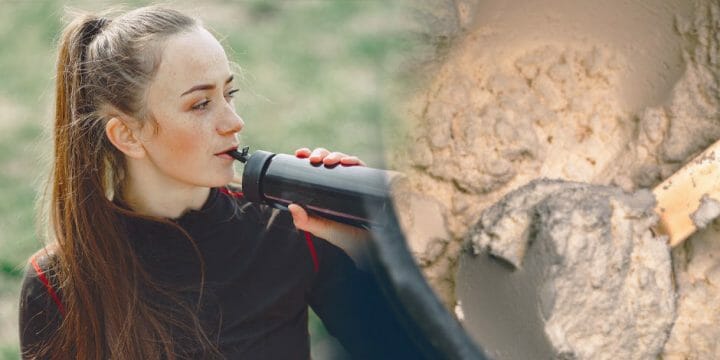Protein shakes are one of the most popular supplements among young and healthy athletes, gym enthusiasts, and bodybuilders.
Since mornings are the best time for workouts and protein shakes are the most efficient when taken after the workout, protein shake has replaced the typical breakfast. But they double as excellent pre-sleep drinks, too.
Our resident dietitian explains why this is the case.
Quick Summary
- Drinking a protein shake before bed helps supplement your muscles with nutrients and enhances recovery.
- Regularly taking a protein shake before sleeping promotes muscle growth and preservation.
- 16 healthy young men who engaged in resistance training in the evening and consumed 40 grams of protein before sleep showed improved post-exercise recovery compared to those who took a placebo.
- Personally, I've found that a protein shake before bed helps me feel more rejuvenated and ready for my morning workout.
Benefits of Drinking a Protein Shake Before Bed
Drinking a protein shake before bed can be more efficient for muscle recovery than post-workout consumption. Here are the benefits of drinking a protein shake before bed.
Promotes Muscle Growth and Preservation

Sleeping can reduce muscle growth, but consuming protein before bed boosts muscle preservation and building. Protein's amino acids are crucial for muscle mass, and they deplete with exercise. A high-protein diet, including a pre-sleep protein shake, helps replenish these levels.
One study revealed that a protein shake consumed before bed is better absorbed in people who workout in the evening [2]. The study concluded that:
“Physical activity performed in the evening augments the overnight muscle protein synthetic response to presleep protein ingestion and allows more of the ingested protein-derived amino acids to be used for de novo muscle protein synthesis during overnight sleep in older men.”
- Andrew M Holwerda et Al
Improves Recovery

Another study discovered that taking a protein shake before bed improves post-exercise recovery [3]. The study included 16 healthy young men who did some resistance-training in the evening. They consumed either 40 grams of protein or placebo before sleep.
The results revealed that the participants who took protein had increased whole-body muscle protein synthesis rates and improved net protein balance compared to the participants who took placebo.
Moreover, the results also showed that protein was more effectively digested and absorbed in the evening.
This suggests that protein shakes taken before bed can provide a quick and efficient source of amino acids for muscle repair, reducing muscle soreness and fatigue and preparing the body for subsequent training sessions.
Promotes Better Performance

Drinking a protein shake before bed may also enhance your athletic performance. Besides strength and muscle growth, a pre-sleep protein shake also regulates the muscle protein metabolism.
Moreover, it can also:
- Enhance overnight muscle reconditioning
- Improve strength during workouts
- Increases lean muscle mass
- Provides you with the ability to exercise longer
- Improves muscle adaptation to exercise training
However, it has been established that consuming 40 grams of protein per day doesn’t promote recovery or performance after a daytime workout.
Improves Energy Levels
A lean muscle mass increase can boost your energy levels, which will allow you to exercise for longer. According to a 2016 study, drinking 40 grams of protein shake before bed enhances the skeletal muscle adaptive response [4].
Consuming protein before bed promotes muscle repair and reconditioning, which leads to increased strength.
Accelerates Weight Loss

This may be hard to believe, but drinking a protein shake before bed can aid in weight loss by burning calories even during sleep. Protein shakes boost muscle protein synthesis and rev up your metabolism. Your body expends extra energy to process the protein consumed pre-sleep, thus burning calories and contributing to weight loss.
However, be mindful of calorie intake. A 40g casein protein shake in water is about 160 calories, but mixing with milk or fruit increases this, potentially leading to weight gain.
Protein also helps control hunger by reducing the hunger hormone ghrelin and increasing the fullness hormone leptin, leading to reduced food intake.
Watch out: low-protein diets often cause saggy skin due to muscle loss. A protein hit before bed can help prevent this common weight loss issue.
Enhances Sleep Quality

Protein intake before sleep can improve sleep quality due to the amino acid tryptophan. The amino-acid tryptophan enhances the production of serotonin — the happy hormone, and melatonin — the sleep-inducing hormone.
You can mix the protein powder in soy milk, regular milk, or Greek yogurt — all rich sources of tryptophan. Incorporating these tryptophan-rich foods with protein shakes before bedtime can amplify the production of serotonin and melatonin, potentially leading to better sleep quality and aiding in overall recovery and muscle growth.
Types of Protein Powders to Drink Before Bed

There are various protein powders like soy, casein, and whey, each promoting muscle growth differently. Whey protein is digested quickly, offering immediate muscle protein synthesis, making it ideal for post-workout shakes. In contrast, soy and casein proteins digest slowly, extending muscle protein synthesis overnight.
While both whey and soy are good pre-bed options, whey, with its slower digestion, is the top choice among the three.
Check out the best protein powders out there:
Who Should Drink Protein Before Bed?

You may want to consider consuming a protein shake before sleep if you:
- Want to enhance your muscle growth or improve your performance
- Workout regularly
- You already consume enough protein
- Are healthy
On the other hand, if your goals don’t include muscle growth or enhanced performance, taking casein protein before sleep may not be worth the hassle. Moreover, slow-acting protein, such as whey, is more efficient for people who workout later in the day.
However, if you have diabetes or insulin resistance, you may be better off not eating before bed.
Cons of Taking Protein Before Bed

So far, I talked about the pros of drinking protein before bed:
- Helps you grow and maintain your muscle mass
- Provides improved overnight recovery
- Enhances energy and performance levels
- Increasing your net protein balance
- Helps with weight loss
- Promotes sleep quality
But, no matter the pros, consuming protein shakes before sleep also comes with a few cons:
It Might Mess up You Circadian Rhythm

Your body's circadian rhythms, those 24-hour internal clocks, don't just control sleep but also hormones. When these rhythms go haywire, often in night shift workers, there's a higher chance of heart disease, depression, and cancer. Both light and late-night eating can throw off these cycles.
So, while a pre-bed protein shake might pump up your muscles short-term, think twice about making it a nightly habit. Sure, it works for quick gains, but it could mess with your sleep and health down the road.
Slows Down Fat Oxidation and Metabolism

FAQs
Is It Ok To Drink Protein Shake Without Working Out?
Absolutely — yes! Shakes are a convenient way to ensure you’re taking in enough protein. However, if your physical activity levels are low, your meals may already meet your protein needs.
What Protein-Rich Food Can Improve Muscle Growth During Sleep?
Cottage cheese, nuts, yogurt, poultry, tofu, seafood, legumes, and lentils are excellent high-protein sources that’ll help you increase muscle mass.
How Many Glasses of Protein Shake Can You Have in a Day?
Typically, you need 0.5 grams of protein per pound of body weight. However, you exercise regularly, you need more — about 0.7 to 0.8 grams per pound of weight. Eating protein-rich food should help you achieve this goal, but you may add dietary protein if you feel like you don’t get enough from your food.
Depending on your deficit, you could consume one or two glasses of protein supplement per day. About 40 grams of casein protein should provide you with optimal benefits.
References:
- https://www.ncbi.nlm.nih.gov/pmc/articles/PMC3381813/
- https://academic.oup.com/jn/article/146/7/1307/4585779
- https://journals.lww.com/acsm-msse/Fulltext/2012/08000/Protein_Ingestion_before_Sleep_Improves.20.aspx
- https://www.mdpi.com/2072-6643/8/12/763
About The Author
You May Also Like






